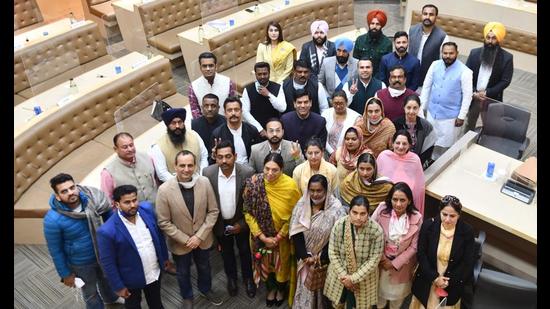Chandigarh MC elections: Why parties will remain on tenterhooks in mayoral race
In the 25-year history of the MC, on several occasions, even a party with one or two seats, has ended up getting their councillor elected as the Chandigarh mayor.
The coveted post of mayor, the first citizen of Chandigarh, has seen pitched political battles over the years, and being a single-largest party or even having a majority in the municipal corporation hasn’t ensured a victory.

In the 25-year history of the MC, on several occasions, even a party with one or two seats, has ended up getting their councillor elected as the Chandigarh mayor.
The upsets were galore in the pre-2017 era, when nominated members had voting rights. There were major reverses for parties even holding a majority of elected members in the house. Even after nominated members’ votes were quashed, cross-voting all too frequently marred the parties’ election calculations.
Nominated members votes scrapped
In 2017, the Punjab and Haryana high court quashed the nominated members’ voting rights in the mayoral elections.
Advocate and former councillor Satinder Singh, on whose petition, the voting right of nominated members was withdrawn, said, “The nominated members’ votes were used to nullify people’s mandate. So, on many occasions, the nominated members played the kingmakers without having to answer to people like the elected councillors.”
The HC while quashing the nominated members’ voting rights, stating, “In the meeting to be convened for the election of mayor, nominated members who have no right to vote in the meetings of municipalities would have no right to vote even in the meetings for election of the mayor of the municipal corporation, Chandigarh.”
No anti-defection law in MC House
The anti-defection law in force in Parliament and state legislature hasn’t been enforced for Chandigarh MC. It can come into force in the MC only after Parliament’s nod.
Satya Pal Jain, senior advocate and senior BJP leader, said, “In the absence of an anti-defection law, no law prohibits councillors from choosing a candidate of their choice irrespective of party. With secret ballot, it is easier for the councillors to do cross-voting. Anti-defection law should be implemented in the Chandigarh MC too.”
The tricky numbers game
In 2001 mayoral election, a Shiromani Akali Dal (SAD) councillor Harjinder Kaur had won the mayoral election, even though, SAD had only two councillors in the house. BJP, with 13 councillors in the house of 20 elected councillors, didn’t participate. In the 10 votes polled on the occasion, seven went to Kaur, and three to her party colleague Mohinder Singh.
Congress candidate Poonam Sharma was elected mayor in 2015, defeating BJP candidate Heera Negi by two votes, even as the BJP had 14 votes, including that of the MP, while Congress had only nine. Of the total 33 votes polled, Sharma got 17 votes and Negi managed to get 15.
In a close contest in 2007, Anu Chatrath of the Congress lost by one vote to Harjinder Kaur of SAD, even though Congress had a clear majority with 13 seats (total elected councillors – 20).
In the 1998 election, even though BJP had 13 councillors and its then ally SAD had two elected councillors, but still the party’s rebel candidate was elected to the mayor’s post.
In another mayoral election, the Congress got its candidate elected with only one elected councillor against BJP’s 13.
Cross-voting fears persist
In the post-2017 period too, with no anti-defection law in place, cross-voting has been the norm rather than exception in the mayoral elections.
In 2019, the BJP, with 21 votes in the house of 27 (including one vote of Chandigarh MP), had a major scare when its candidate could win by only a narrow margin. Rajesh Kalia only got 16 votes and rebel candidate Satish Kainth received 11 votes, even though BJP had 22 votes in the house of 27, and Congress only four. Kainth later joined the Congress.
In the previous year too, the party’s candidate Davesh Moudgil had got one vote less than the party’s total votes. In the last election of the outgoing house too, the winning BJP candidate Ravi Kant Sharma got two less votes than 19 votes the party councillors cast.
In the newly elected MC house too it’s anybody’s game. Aam Aadmi Party (AAP) has 14 votes, BJP 13, Congress 8 and SAD 1. “Unlike the outgoing house where BJP had brute majority, and so cross voting didn’t cost the party an election, this time around, all the three parties are neck-to-neck. With cross-voting a real possibility, all three parties - Congress requires 19 votes from total 37 votes, BJP 6 and AAP 5, are in the race,” said a veteran BJP leader requesting anonymity.





